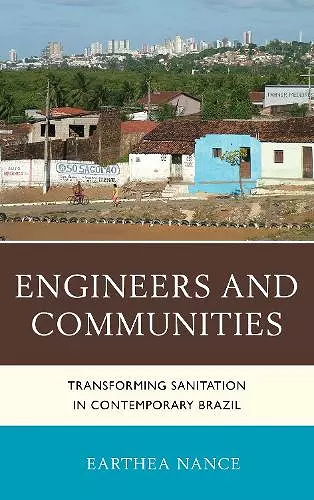Engineers and Communities
Transforming Sanitation in Contemporary Brazil
Format:Hardback
Publisher:Lexington Books
Published:15th Nov '12
Currently unavailable, and unfortunately no date known when it will be back

Access to water and sanitation service in industrialized countries is nearly taken for granted, but in many developing countries less than half of the population has access to such services. Decades of effort on a global scale have been invested to solve this problem. One such effort—Brazil’s participatory approach to water and sanitation—is Nance’s subject in Engineers and Communities. In the early 1980s, Brazilian engineers created participatory sanitation (known locally as condominial sewerage) to make basic sanitation service more inclusive. Fiercely contested at first, the technology’s success hinged on the formation of strong and stable coalitions of diverse actors and on the promotion of both real participation and a participation narrative. The innovations described in the book contributed to the now indispensable concepts of community participation and locally appropriate technology. Today the technology has spread across Brazil- it has been legally incorporated into sewer design norms and codes, it is counted in the national census, and the model is being transferred to other countries by The World Bank and others who are trying to make basic urban services more inclusive of the poor. Engineers and Communities sheds light on what is essential in the broader discourse of international development.
Earthea Nance's innovative study of the emergence of 'participatory sanitation' artfully applies Bruno Latour’s edict to ‘follow the actors’ to show how, rather than from participation, project success follows from strong ‘project coalitions’. While the material content of these ‘coalitions’ is essential for success, the claim that they are participative is shown to be discursive rather than substantive in character. This timely illumination of the significance of not only the socio-material, but also narrative character of development, provides an important and insightful contribution to the literature. -- Stephen Healy, University of New South Wales
This book is among a small number of empirical social studies of utility infrastructure conducted within an urban political ecology framework. By viewing infrastructure development as a socio-technical process, Nance is able to concisely identify and unpack constructs contributing to the success and failure of participatory sanitation projects in Brazil. Engineers and Communities Transforming Sanitation in Contemporary Brazil provides both surprising and practical insights that can help guide and evaluate a broad range of utility infrastructure development programs. -- Scott Miles, associate professor, Western Washington University, and director, Resilience Institute
ISBN: 9780739126813
Dimensions: 236mm x 160mm x 21mm
Weight: 458g
214 pages